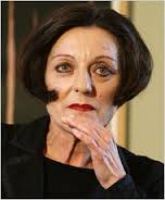Herta Müller (1953) was born in the village of Nitzkydorf in Banat, a region in western Romania. She attended university in Timişoara, where she became affiliated with the so-called Aktionsgruppe Banat, a group of German speaking writers founded with the aim of pursuing literature that was socially and politically engaged. Following completion of her university studies Müller worked as a translator in a factory until 1979, when she was dismissed for her refusal to cooperate with the secret police. She was subjected to increasing scrutiny by the secret police in Romania and in 1987 left the country and was granted citizenship in West Germany. She has published numerous essays, short stories, novels, and several collections of collage poetry, including one in Romanian. She is the recipient of several literary prizes, most prominently the Nobel Prize for literature, but also, among others, the Kleist Prize (1994), the Aristeion European Literary Prize (1995), and the Berlin Literary Prize (2005).








